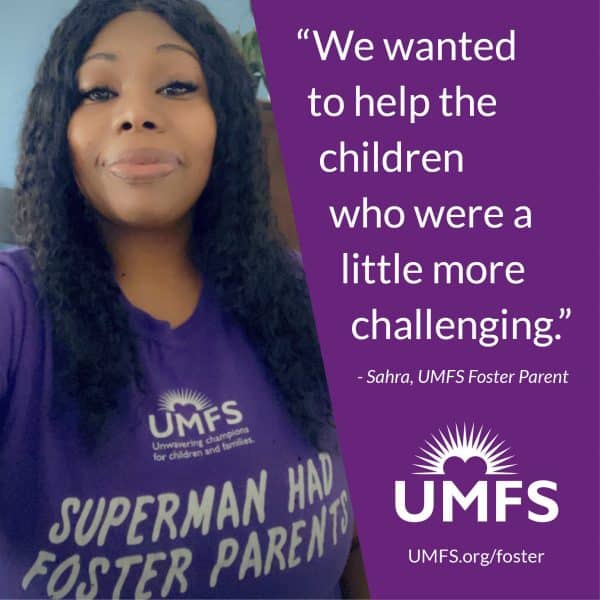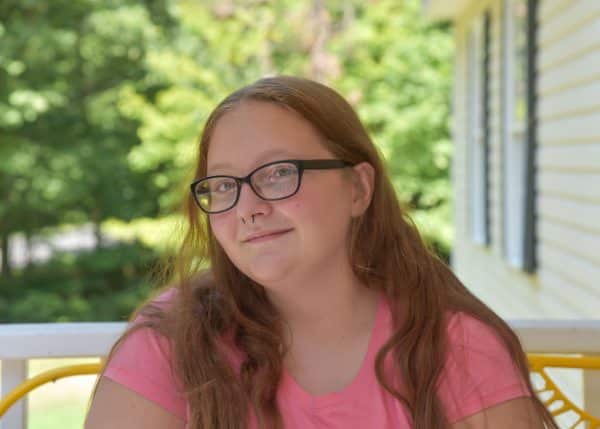Therapeutic Foster Care vs. Traditional
When a child or teen first enters foster care, we may not fully understand their emotional and behavioral needs.
Youth are placed in a traditional setting if they don’t seem to have significant issues and need basic nurturing and supervision from an adult caregiver.
If the child appears to have emotional, behavioral, or medical concerns, they may be placed in a therapeutic foster care home.
Therapeutic Foster Care vs. Traditional
When a child or teen first enters foster care, we may not fully understand their emotional and behavioral needs.
Youth are placed in a traditional setting if they don’t seem to have significant issues and need basic nurturing and supervision from an adult caregiver.
If the child appears to have emotional, behavioral, or medical concerns, they may be placed in a therapeutic foster care home.
Benefits for Therapeutic Foster Parents
Continued Training and Collaboration
UMFS offers ongoing access to resources, local support groups, 24-hour on-call support, and counseling.
Individualized Strategies
Our team will help you develop a plan to meet the specific needs of your child or teen so they can turn a corner.
Reliable Respite Care
We can help you secure the services of a trained respite caregiver who can give you a break and also support the child.
Extra Stipend Based on Needs
Children in therapeutic foster care may have special requirements and you’ll get the funds you need to help them.
What is Therapeutic Foster Care and How Is It Different From Traditional Foster Care?
Therapeutic foster care is also known as treatment foster care. Foster care children and youth can benefit from a higher level of care if they:
- Have special emotional or medical needs
- Have mental health or behavioral issues
- Have missed developmental targets
- Don’t display age-appropriate behavior.
Traditional foster care offers a supportive and nurturing home environment for children who don’t have these complex concerns.


Why Are Children in Traditional Foster Care & Therapeutic Foster Care?
Children and teens of all ages enter foster care because they can’t continue living with their family of origin. These children and their families are often going through a crisis. These situations may include:
- Neglect
- Abuse
- Traumatic experience
- Unsafe home environment
- Incarceration of a parent
What Are the Needs of Children in Therapeutic & Treatment Foster Care?
Therapeutic foster care and treatment foster care involve a higher level of care than traditional foster care.
A therapeutic foster home offers:
- More supportive and structured home environment
- 24/7 care and supervision
- Long-term support to function and integrate into the community
- Ways to address inappropriate behaviors
- Provision for medical and education needs

How to Become a Foster Parent
| Step 1 | Attend an Info SessionLearn more about the unique needs of youth in treatment foster care and the support you’ll receive so you can help them. |
| Step 2 | Pre-Service TrainingComplete 25 hours of required training to prepare your family to meet the needs of children and teens in care. |
| Step 3 | Home Study & PaperworkUMFS conducts an assessment of a parent’s ability to provide a safe and nurturing family environment for a child. |
*The whole process typically takes about 4 months.
More Differences Between Therapeutic Foster Care vs. Traditional
Training for Traditional Foster Care Parents & Therapeutic Foster Care Parents
With traditional foster care, parents must obtain 30 hours of pre-licensing training. For those providing therapeutic foster care, this increases to 37 hours of pre-licensing training. Therapeutic foster care parents also learn improved coping skills and how to manage some of the most challenging scenarios as part of training.
Both types of foster care involve post-licensing training. Traditional foster care requires nine hours. However, in therapeutic foster care, the need for ongoing support and guidance intensifies. These parents can expect to perform 28 hours of post-licensing training.
What Are the Restrictions on the Number of Children in a Therapeutic Foster Home?
With therapeutic and treatment foster care, foster parents provide more support than offered in a traditional foster care environment. For this reason, the number of children is limited.
In traditional and therapeutic foster care, the number of children you may foster depends on a home assessment to determine your capacity to provide care, protection, and experiences that enhance healthy development and offer the necessary physical space.
In therapeutic foster care, the home is considered the primary treatment setting for the child. Foster parents are provided with a high level of training and preparation to accommodate the child’s needs.
Support for Foster Parents
Parents providing traditional foster care have ongoing support, contact, and visits from their caseworker on a monthly basis. Based on the level of needs, agency support increases for those providing therapeutic care.
Caseworker contact, visits, and service coordination occurs on a weekly basis with individual support services occurring with the child at least once a month. Staff are available 24/7 to provide help and support.
Choosing the Right Foster Care Program
Making the decision to provide any type of foster care is a big decision. Whichever level of care you choose to offer, you will need significant amounts of training and dedication. You may learn about traditional foster care and then realize you have the life experience, passion, and room to provide therapeutic foster care.
It’s important to consider both options carefully and work closely with program staff to learn what you can expect.
 Help Children Like LaQuita
Help Children Like LaQuita
LaQuita is an example of a child who can benefit from therapeutic foster care compared to traditional foster care. Foster care combined with the UMFS Child & Family Healing Center (CFHC) is what eventually helped her overcome the challenges of her past and move forward into a positive future.
Much of LaQuita’s youth was spent in constant motion, bouncing from foster home, to group home, to residential program, and back to foster home until she joined the Navy at 18. She had to overcome a lot to become the courageous person she is today and UMFS had a lot to do with the transformation.
She said her first stint at UMFS was especially difficult as it was during that time that her mother passed away. LaQuita said staff members were tremendous in helping her cope. LaQuita also struggled with anger issues and had a hard time controlling her temper when she was younger. But an attentive UMFS staff and support from therapists helped her break down emotional barriers.
By providing a therapeutic foster care home, you could make a difference in a child or teen’s life so they don’t need to bounce around so many foster homes and centers. You can put an end to the chaos after a difficult start.
Who Is UMFS?
UMFS is a nonprofit organization that provides a comprehensive array of programs to support children, teens, and parents as they work to overcome challenges. We equip families with tools for success so they can achieve their goals. As a national leader in helping young people and families, we also proactively identify unmet social services needs and develop the necessary partnerships to address those needs.
Therapeutic Foster Care FAQ
What is foster care, treatment foster care, and therapeutic foster care?
Foster care is when a child or teen goes to live with a foster family because their primary caregivers are unable to care for them. The parents may be unable to provide care due to anything from financial stress to drug abuse, and they may have been reported to child welfare.
Foster parents provide a safe, stable, temporary home for children in foster care in order to provide the best opportunity for the children to thrive. The foster family may have additional biological children of their own or additional children in foster care. The average length of time a child spends in foster care in the U.S. is 12 months.
The goals for each child and teen in foster care varies – many return to their primary caregivers whenever possible. If returning home is not possible the child may be adopted or seek other foster care services. At 18 or 21, the child ages out of the system and may seek other support systems to thrive as an adult. But many face homelessness and unemployment.
Treatment foster care is for youth ages two to 21 who need extra structure and support. A major focus of treatment foster care is teaching older children functional skills—social, independent-living or academic—to help them succeed in school, with their families and in work settings.
Providers of Therapeutic or Treatment Foster Care (TFC) get additional training and support to meet the needs of children with specific emotional, behavioral, psychological, or medical needs, possibly due to past trauma or abuse.
What are the requirements to become a therapeutic foster care parent?
Prospective foster parents need to meet these prerequisites to begin the foster parent process:
- 21 or older
- Stable form of income
- Ability to pass a Child Protective Services and Criminal History Search
- Valid driver’s license and reliable transportation
- Personal references
- Physical space in your home
- Emotional space in your life
- Medical information
There are no specific religious requirements or restrictions to participation.
What training and support is available to therapeutic or treatment foster care providers?
- Get 37 hours of pre-licensing training compared to 30 hours for traditional foster care parents
- Perform 28 hours of post-licensing training compared to nine hours for traditional foster care
- Continued evidence-based training and collaboration with a treatment team to improve the child’s behavioral health
- Individualized, trauma-informed strategies to address each child’s needs
- Local support groups
- 24-hour on-call support
- Counseling
- Reliable respite
- Stipend
What is a typical child or teen in foster care like and what have they been through?
Youth in foster care can be any age from infant to 18. The average age of a foster care child in the U.S. is eight. The children and teens in foster care represent all cultural and socioeconomic backgrounds. They are frequently part of a sibling group or teens.
When it comes to children who need therapeutic foster care, the child may have experienced financial hardship leading to malnutrition, or suffered from neglect or abuse. The children may have mental health issues or may suffer from post-traumatic shock syndrome (PTSD) due to what they have experienced.
The treatment foster care program does not accept children who are currently at risk for harming themselves or others.
Can I adopt a child through the foster system?
Yes, in Virginia, 70% of foster youth are adopted by their foster parents.
Get in Touch With UMFS Today
Therapeutic Foster Care Resources
A Lesson Learned Through Mentoring
If you’re not ready to become a foster care parent, you could become a mentor and offer guidance to a child or teen in foster care.
Benefits of Donating to Foster Care
Your monthly or one-time donations have a positive impact on youth in foster care, support foster parents, and change lives – including your own.
How To Help Teens Aging Out of Foster Care
Many teens in foster care don’t return to their birth family and aren’t adopted. Find out how you can help teens as they enter adulthood alone.
